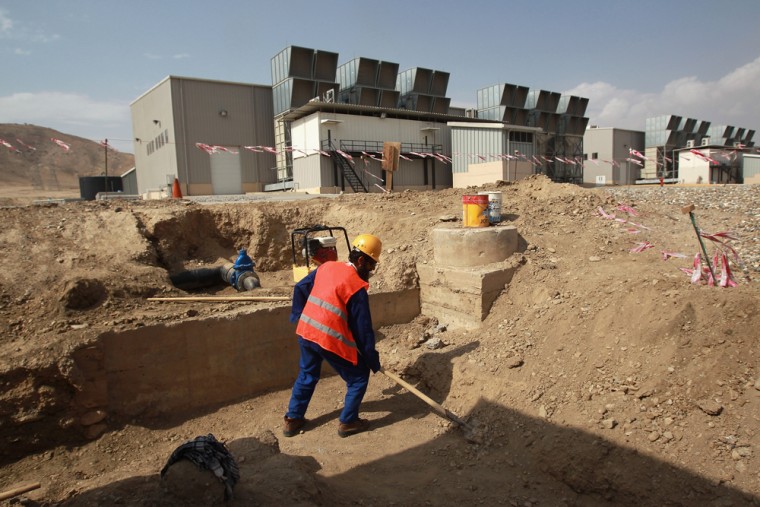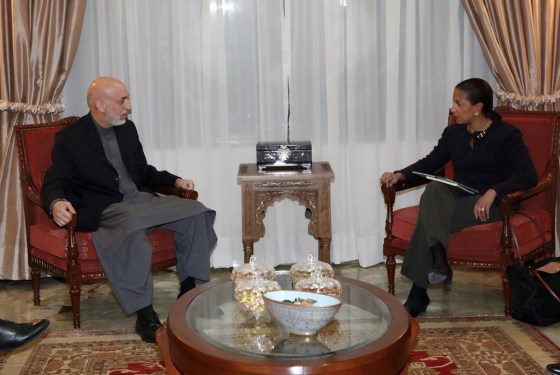Behind a seemingly never-ending game of brinkmanship with the United States over a bilateral security agreement, Afghan President Hamid Karzai has a simple goal, according to U.S. military officials: Ensure that billions of dollars in aid from Washington continues to flow to feed the cycle of corruption that keeps him in power.
“It’s all about the money,” said one senior U.S. official, who like the others spoke with NBC News on condition of anonymity.
The poker game over an estimated $4 billion to $6 billion a year in U.S. and NATO aid that would be expected to continue to flow into the country if a new agreement is signed is playing out on the stage of international diplomacy, but U.S. officials say financial considerations are driving Karzai’s negotiating tactics. Those considerations reportedly include bags of cash he collects from the CIA.
It took well over a year for the United States and Afghanistan to hammer out the bilateral security agreement approved last weekend by the Loya Jirga, an assembly of Afghan elders.
But Karzai promptly raised the stakes again this week, telling National Security Adviser Susan Rice that he would not sign the bilateral security agreement with the U.S. unless the Obama administration agrees to a new set of last-minute demands: That it take a role in peace talks with the Taliban and release 17 Afghans held at the Guantanamo Bay detention center.
The White House pushed back, with Rice essentially telling Karzai to sign the agreement by the end of December, or the U.S. would pick up its troops -- along with the billions in future financial aid -- and go home by the end of 2014.
The second part of that threat undoubtedly got Karzai’s attention, U.S. officials say, because the U.S. aid is crucial to his future as Afghanistan heads toward a presidential election on April 5, 2014 – a campaign for which Karzai is not eligible due to term limits.
The Afghan government and large segments of society have become heavily dependent on U.S. aid over the past 12 years. But corruption is rampant in Kabul and U.S. officials believe it can never be eliminated.
“It’s a cost of doing business in Afghanistan at every level,” said one official.
The Special Inspector General for Afghanistan Reconstruction, or SIGAR, attempts to enforce some level of accountability for U.S. money, and will play an even more critical role as the draw-down of U.S. military forces continues. It does so by “focusing on detecting fraud, building criminal and civil cases for prosecution in the United States and Afghanistan, tracking the flow of stolen reconstruction funds, preventing poorly performing and corrupt individuals and companies from being awarded U.S.-funded contracts, and exposing lax management practices both inside U.S. programs and Afghan ministries that place U.S. taxpayer dollars at risk,” it said in its most recent report to Congress on Oct. 30.

But Pentagon officials say the CIA has helped feed the system with “off-the-books” satchels of cash -- “tens of millions of dollars” that it delivers to the Presidential Palace in Kabul on a regular schedule.
The cash payments began prior to Karzai becoming president on Dec. 22, 2001, beginning while he was in exile during the last years of the Taliban regime, one former U.S. intelligence official told NBC News, speaking on condition of anonymity. It's not clear if Karzai would continue to be the conduit for such payments after he leaves office.
The CIA declined to comment on the payments.
Karzai openly admits receiving the money, saying he needs it to pay government officials. But there is zero accountability and it’s widely accepted within the U.S. government that whatever Karzai doesn’t pocket he doles out in political and protection payoffs. He also is believed to have smuggled “hundreds of millions of dollars” out of the country, much of which flowed directly from the U.S. Treasury, the U.S. military officials say.
That makes his gambit to delay signing the security agreement risky, U.S. officials say. If he digs in and American troops leave, “Karzai will not survive,” as one put it, and any influence he hopes to have over the election and the future government will be lost.
The corruption in Karzai’s government prompted the U.S. to tie any future U.S. financial aid directly to an ongoing American military presence – probably in the range of 8,000 to 10,000 troops – in Afghanistan once the U.S. combat mission ends next year, the U.S. say.
That also represents a major gamble by Washington. U.S. military officials have long feared that if all American forces were withdrawn at the end of 2014, the hard-fought gains from America’s longest war would be erased, possibly allowing the hardline Islamist Taliban to return to power.
But neither is the U.S. willing to watch billions in aid disappear into the pockets of Karzai and his political supporters.
While the U.S. forces -- whose primary missions would be to train the Afghan military and conduct limited counterterrorism operations -- wouldn’t be able to account for every dollar, they would provide at least some level of oversight beyond SIGAR, U.S. officials believe. And without that, they say, the vast amounts of money spent to train and equip Afghan forces would simply vanish.
Despite the current stalemate between Kabul and Washington, U.S. military officials believe the security agreement running through 2024 will be reached and that the money will again be the motive. In fact, senior U.S. military officials say because of that there’s already pressure mounting on Karzai from within his own government to reach a deal with the Americans on that bilateral security agreement.
But if that is not the case, one senior defense official said, the U.S. has made it clear that it will not pull out and hand the Karzai government a “blank check.” “If we can’t get an acceptable agreement we’ll wash our hands and walk away,” the official said.
NBC News Investigative Reporter Robert Windrem contributed to this report.
More from NBC News Investigations:
- Drone tries to sneak contraband into Georgia prison
- Ex-FBI agent Levinson marks sad milestone in captivity
- 'Recipe for disaster': Haitian human smuggling on rise
